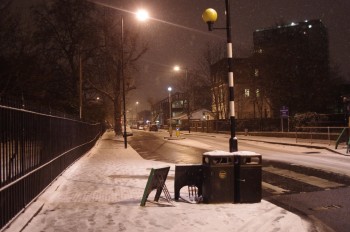We are developing the social individualist meta-context for the future. From the very serious to the extremely frivolous... lets see what is on the mind of the Samizdata people.
Samizdata, derived from Samizdat /n. - a system of clandestine publication of banned literature in the USSR [Russ.,= self-publishing house]
|
A lot of British people have done a “John Galt” in recent years, it seems, according to UK member of Parliament Nick de Bois:
Mr de Bois said tax does play a part in emigration, but suggested that culture is a more important factor, warning that Britain should encourage people to succeed and get rich, not criticise them. “Government must help lead a culture change in this country that competes with the new economies, one where competitiveness and success are valued and personal achievement and personal wealth are respected, not pilloried,” he said.
If you are mystified by the “Galt” reference (most Samizdata regulars will know it), it refers to the plot of Ayn Rand’s Atlas Shrugged, in which a character called John Galt leads a “strike” of the top businessmen, scientists, artists and others to abandon their work at a time when such people are increasingly hampered by the State. In the US, the expression “Going Galt” has caught on to describe the sort of thing written about here.
Of course, emigration needn’t be a bad sign for a country and indeed, in some countries, emigration can relieve domestic pressures. In the 19th Century, large numbers of Britons left for the New World, seeking a better life. Of course, many from the around the world did so for reasons of persecution and poverty. The ability to exit a country is also one of the few things that might persuade an otherwise foolish government to pursue policies that encourage wealth creation rather than hurt it. As I have noted before, the ability of the super-rich – or indeed far less wealthy people – to get their money abroad, or move overseas, can be a healthy constraint on government. That is why I think “tax competition” between jurisdictions, far from being an evil, as leftist campaigners claim, is a good force in the world. And so it is important to bear in mind that when governments impose capital controls and exit visas, be very afraid.
In the meantime, although I don’t agree with all of its views, this book, Exceptional People: How Migrants Shaped Our World and Will Define Our Future, by Ian Goldin, Geoffrey Cameron and Meer Balarajan, is worth a read. (I am not so keen on some of its Transnational Progressivist leanings, though).
I recently read a fiery book, full of strong argument, well-presented data and verve, by Robert Zubrin, called “Merchants of Despair: Radical Environmentalists, Criminal Pseudo-Scientists, and the Fatal Cult of Antihumanism… ” The book takes a blowtorch to today’s heirs of the Rev Thomas Malthus, the 18th/early 19th century political economist who argued that Man is doomed to outrun resources. Zubrin nicely skewers this reasoning, and takes on a range of population control characters ranging from Nazi advocates of eugenics through to supposedly well-meaning birth control enthusiasts in post-imperial India. (In the latter case, birth control was carried out with great brutality, as it was in China, with its “one-child” policy.)
And now, Sir David Attenborough, famous to generations of British TV viewers for his programmes about the natural world, reiterates the idea that humans are a “plague” on the planet and that there should be a lot fewer of them. Don’t worry, Sir David: judging by childbirth rates not just in the West, but in certain other countries, the risk of an accelerating growth in population numbers is unfounded, or at least that is how it seems to me. In some extreme cases, such as Japan and Italy, or arguably, Russia, the population is actually shrinking. (Maybe people just don’t get randy in those countries any more). According to this article in the New York Times, population growth of the sort that gets Attenborough so steamed is not happening and may be in reverse soon. Attenborough is not just wrong, he’s out of date.
Attenborough will be listened to with a certain level of respect that gets granted to persons of his type. He is very grand, and yet comes across also as that “jolly nice English chap who likes his gorillas, moths and strange fish”. What he seems to lose sight of is that humans are as much a part of nature as any other species, and that he wants to deny to humans what any other creatures pursue, which is to thrive and flourish. (In the case of other species, they do so through the iron process set out by Darwin. A paradox, given that humans are the only species we know of to care about the fate of other animals.) Then there is the point, made by the late Julian Simon and others, that humans are themselves a crucial resource, a fact that those who take a fixed-wealth approach to life seem to overlook. (Simon famously beat population-control fanatic Paul Ehrlich in a bet about the prices of commodities. Ehrlich’s predictions have been so wrong as to be beyond parody.)
There is also the assumption that people who have “too many kids” in poor countries such as Ethiopia are too thick to figure out the supposed downsides (in countries where there are few social safety nets and mortality rates are high, having plenty of kids is entirely rational).
The history of government-led efforts at birth control and population control has been that it is ineffectual at best and savagely brutal and destructive, at worst. If you have any doubt of that, read Zubrin’s excellent book, and ask yourself what sort of person can support the ideas of Sir David, and his ilk, given the likely results.
Correction: a reader points out that it was Thomas Carlyle, not Malthus, who branded economics as a dismal science. My error.
A couple of years ago, Oliver Stone made a pro-Chávez film, South of the Border. ‘I admire Hugo,’ Stone declared. ‘The pure energy of the man is intoxicating.’ Such condescension modernises the 18th-century myth of the Noble Savage. ‘I know President Chávez well,’ claimed an equally condescending Sean Penn, the actor. ‘He is a warm and friendly man with a robust sense of humour.’ After a sponsored trip by car around Venezuela with Chávez, Penn posted on the internet a diary of thousands of words recounting in soapy detail their time together. ‘El Presidente is really human, like a brother.’ ¡Mi Hermano! Without embarrassment Penn could boast, ‘Just Hugo and me in a convoy of black vehicles.’ And in the course of the drive the wonderstruck Penn caught sight through the car windows of poor people standing by the roadside and weeping with love.
David Pryce-Jones, eviscerating the sort of people who look up to thugs such as Chavez. There is nothing wrong with admiring a political leader, democratically elected, who respects the checks and balances of a genuine liberal order, and who has the necessarily humility to realise the limits of office. I can admire such a person, but I find the sort of worship for political leaders, both democratic and non-democratic, that we see still today, to be alarming.
On a related point, I can recommend a study by Gene Healy – of the CATO Institute – about the glorification of the role of president in the US in recent times. There has been some creepy behaviour around those who venerated Mr Obama, although perhaps some of the mockery of him suggests not all of this should be taken seriously.
In a discussion about a computer game, someone mentioned a book about 18th century piracy: The Invisible Hook by Peter T. Leeson. Click to look inside and the first words you will read are:
I’m not a historian. Nor am I a pirate. I’m an economist with a long-standing interest in privately created law and order who happened to wonder one day how pirates cooperated since they had no government.
Sold!
Here is a classic piece of nonsense to start this week in chilly Britain:
The UK tax authority said the amount of tax that big companies may have underpaid by using artificial intercompany transactions to inappropriately reduce taxable profits has risen 48 percent last year. The figure comes as public anger grows over tax avoidance by big businesses and British MPs investigate possible remedies.
– (From a report from Reuters.)
I read this report carefully and nowhere does it say that the firms concerned have broken laws, engaged in fraud, or used violence or engaged in criminal acts. They are taking full advantage of the laws of the jurisdictions with which they have contact, as their shareholders would expect them to do in maximising shareholder returns. If politicians really wanted to reduce what they see as such dodgy tax avoidance, perhaps they should enact taxes that are simple, low, and flat. This is not rocket science, as the 2020 Tax Commission report issued last year showed.
The recent naming and shaming of Starbucks, for example, of simply making use of legal arrangements, was particularly odious. No wonder people are thinking that we are living in a world like something from the pages of Atlas Shrugged.
Tim Worstall writes about this sort of issue a lot, usually in the process of skewering that socialist “accountant” from Wandsworth, Richard Murphy. Tim is always entertaining and instructive at the same time.
I can appreciate that it is important to attract visitors, for the economy and all that. But there is always a balance to be struck between encouragement and grovelling. If Johnny Foreigner wants friendly he should go to America. There the natives are capable of wishing you a nice day without even a hint of irony. Here if someone approaches you with a wide smile and an outstretched hand you feel not warmth but deep suspicion.
– Nigel Farndale
I remember reading Kate Fox’s “Watching the English” a few years ago and laughed out loud at some of her sharp insights about how we natives behave on this small, damp island.
Last October, I went shopping with my wife around San Francisco during a business/recreation trip to the Bay Area. With one exception – where I got treated rather rudely by a shop assistant – I was blown away by the friendliness and helpfulness of people and how it was done without being patronising or somehow false. Yes, California has its problems these days, but I wish I could import some of the attitude there to the UK.
It is always interesting that when newspapers cover Chinese news, mentions of history’s most prolific mass murderer just get reported baldly without much comment:
Players won points for acts of selfless Communist spirit and the winners were greeted, on screen, by Chairman Mao in Tiananmen Square. Points were deducted, however, each time a player had to be taken aside by his local Party secretary for a “corrective chat”.
– China embraces online gamers
Yet somehow if a German videogame maker (let alone a government sponsored one) were to feature that also-ran mass murderer Adolf Hitler ‘greeting’ players on screen in a video game, I suspect the reportage might be… a tad different.
Curious, no?

London, January 18, 2013
“Snowfalls are now just a thing of the past”
– The Independent, March 20, 2000
“Imagine a British politician saying: we’re so worried by the abuse of prescription drugs that we’re going to reduce the supply of powerful painkillers to our hospitals. And if people in genuine pain suffer as a result, too bad. The protests from the #WELoveTheNHS lobby would be deafening. The politician who said it would be out of office by the end of the week. But that’s exactly what Michael Bloomberg, Mayor of New York, has just announced.”
– Damian Thompson.
In some ways, Michael Bloomberg is merely being more honest than most puritans are prepared to admit. He openly says what they think. It is shocking, but in his own, depraved way, people like this man are doing us a favour in putting the horror of their views right up there, front and centre.
I have had a brief period of being in bad pain and thanked those brilliant scientists out there for inventing the drugs to remove it. And millions of people who have suffered excruciating pain have managed to get through thanks to painkillers. He would rather they suffered “a little bit” than that anyone should get addicted.
It is hard to be charitable and hope that he never suffers extended pain.
I like photographing new London buildings, the taller the better. And I am also very fond of photographing cranes, which can be quite dramatic but will soon be gone. So, when a new tower started getting built just across the Thames from me, all the while lovingly tended by just the one very tall crane, I photoed it, quite often.
Here is how the tower and its crane looked in May of last year.

That’s a shot taken from Vauxhall Bridge.
Here is a somewhat more artistic shot of the top of the tower, and its crane, taken last November, from Vauxhall Bridge Road, which is to say from rather further away:

But now look at them, as photoed by me this afternoon:

The tower is okay, but the crane is in a sorry state.
During this morning’s rush hour, when it was very misty, a helicopter smashed into the crane. As you can see, the crane suffered badly, but what happened to the helicopter was far worse. It lost its blades, plummeted to the ground in flames, killing its lone occupant, the pilot, and another person on the ground. Blazing aircraft fuel was all over the place, and nearby cars were engulfed in the resulting flames and themselves also exploded. Had it happened rather later, when the road where all this happened would probably have been traffic-jammed, it might have been an order of magnitude more horrific.
Not surprisingly, this is one hell of a news story.
This afternoon I got nowhere near where all this drama had happened, and didn’t seriously try to. But a zoom lens was all I needed to photo what happened to the crane, and this will surely get photoed a lot, for as long as it stays up there for all the world within about half a mile to see. I’m guessing that there is going to be lots of tidying up and sorting out to be done at ground level, before it will become possible to replace the crane, and finish building the tower.
Terrible. Deadly. And, given how costly it is when a major building project is at all seriously delayed, as this one surely will now be: very expensive.
LATER: A better view of the ruined crane, in the form of an expanded detail of the crane itself, minus most of the tower, here.
If you are a national government wasting spending investing at least A$27.5bn (£18bn) of taxpayers’ money – over $1000 per capita – on building a government owned “National Broadband Network” because you think it is the job of the government do do this kind of stuff, and you then employ civil servants to ghost-write articles that can be published in the media under the bylines of lazy journalits, it is not a terribly good idea to include journals published by libertarian think tanks amongst your target publications.
Today a friend from way back who is a structural engineer by profession dropped by. He is semi-retired now, but was not so long ago a pretty big cheese in the bridge designing trade. He still has quite a bit of influence on bridge designing, albeit rather less now than he used to have.
He told me of an engineering bee, concerning train safety, now buzzing about inside his head.
Trains are, on the whole, he said, very safe. But apparently level crossings are the big train exception. A trickle of deaths? A rather big trickle, he replied. “Scores every year” was the phrase I recall him using. I don’t know if that’s quite right, but level crossing deaths are certainly a big deal in Britain.
Perhaps partly because he is a bridge designer, my friend believes that where possible and where not too disruptive and expensive, level crossings should be replaced by … bridges.
Trouble is, there is an acronymic organisation (I think he was talking about this one) concerned with British train safety, which demands very large clearances, both upwards and sideways, for all new road bridges over railways. And it takes only a small increase in a demanded clearance size to require a greatly more elaborate and expensive bridge. Which means that a lot of bridges, that might be built, aren’t.
Partly this demand for big clearances is because at some future date the railway line in question might be electrified, and in the meantime, space must be left under all bridges for that.
My friend says: Fine. In the meantime build smaller but temporary bridges. If electrification ever happens, replace these small bridges with bigger bridges. (Or, I suppose, go back to having level crossings, although that possibility wasn’t mentioned.) Meanwhile, save many lives now lost at level crossings.
But partly, the reason is a safety consideration of another kind. Says the acronymic organisation: all imaginable train wobblings, including the most unlikely, must be allowed to occur under all future bridges without any train afflicted by such wobbling hitting the bridge, even though many existing bridges allow for no such wobblings, with no detectable effect on train fatalities.
Result? The rather big trickle of deaths at level crossings goes on, and on, and on. In the pursuit of even more perfect safety where perfect safety has pretty much already been achieved, a closely related and very unsafe circumstance is caused to persist.
The pursuit of safety, badly done, is resulting in the persistence of unsafety.
When people now speak, as they so often now do, of “health and safety gone mad”, this is one of the things they surely mean. It isn’t just that safety is pursued and damn everything else. Safety is also pursued in accordance with mindless rules, that have the effect of reducing safety itself.
Something tells me that this is not the only example of such perverse safety thinking.
|
Who Are We? The Samizdata people are a bunch of sinister and heavily armed globalist illuminati who seek to infect the entire world with the values of personal liberty and several property. Amongst our many crimes is a sense of humour and the intermittent use of British spelling.
We are also a varied group made up of social individualists, classical liberals, whigs, libertarians, extropians, futurists, ‘Porcupines’, Karl Popper fetishists, recovering neo-conservatives, crazed Ayn Rand worshipers, over-caffeinated Virginia Postrel devotees, witty Frédéric Bastiat wannabes, cypherpunks, minarchists, kritarchists and wild-eyed anarcho-capitalists from Britain, North America, Australia and Europe.
|







